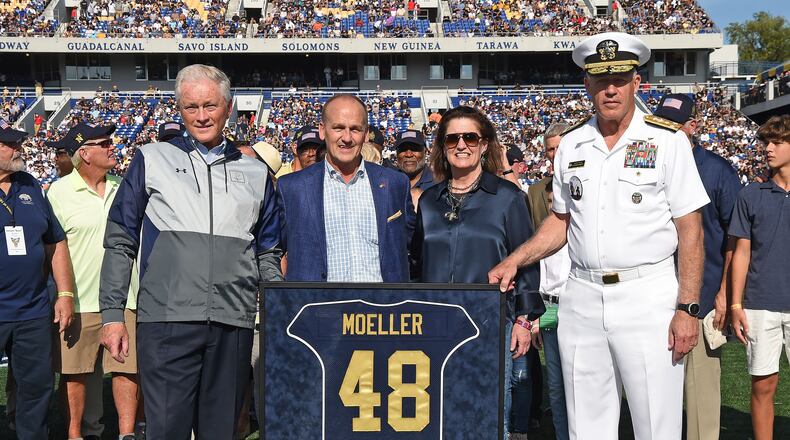That honor now joins a trophy case full of recognition for Moeller’s college career, including consensus All-American and enshrinement in the College Football Hall of Fame.
Moelller once told Marc Katz of the Dayton Daily News about the time Michigan assistant coach Gary Moeller visited him at Fairmont West and verbalized what other Power 5 schools likely were thinking of the Dragons’ 6-foot, then 155-pound defensive back and split end:
“He told me I was too small and too slow.”
Moeller’s two best college offers were from Ball State and Bowling Green.
But then Navy saw some things it liked in him. He said Fairmont West coach Dick Hoppe had instilled in him the tenets of hard work, discipline and intensity.
As he led the Dragons to a 15-4-1 record in his last two years of high school, Moeller won All-Greater Dayton, All-Western Ohio League and third team All-State honors. He was presented the Charles Finley Award as West’s best male athlete.
Although he started his plebe year at Navy as a sixth team defensive back, he gained weight and notice and by his sophomore year – with George Welsh as the Midshipmen’s new coach and Len Fontes, who had come over from the Dayton Flyers as his position coach and mentor – Moeller quickly moved up the depth chart and was the starting strong safety when the season began.
Moeller became known for his hard-hitting, tenacious and, at times, seemingly reckless style. He was the heart of Navy’s famed 5-2 defense, which, in 1975, was ranked No. 3 in the nation for fewest yards allowed per game.
How tough was he?
Well. there was the time in 1975 when he broke his hand in the Air Force game. Once he and his unit returned to the sideline, he as quickly fitted with a soft cast and played the rest of the game.
A week later his give-no-quarter style knocked two Syracuse quarterbacks out of the game.
A co-captain of the team, he never missed a play all season.
That year Navy blanked the Tony Dorsett-led Pitt Panthers, 17-0. The following season Pitt was the national champion.
His junior season Moeller led Navy to a 7-6 upset of No. 8 Penn State. He had 13 tackles – three of them for losses – and was named Sports Illustrated Player of the Week.
In Moeller’s three seasons as a starter, Navy beat Army three times, outscoring the Black Knights, 100-6.
Moeller was Navy’s first consensus All American since quarterback Roger Staubach in 1963. The next wouldn’t come until 1983 when Napoleon McCallum was honored,
After college he sent six months as a grad assistant under Welsh and then joined the Marine Corps.
He was an officer about to be sent overseas in 1980 when he was diagnosed with diabetes and given an honorable discharge.
Although he hadn’t played football in four years, three NFL teams showed interest in him.
He already had made a commitment to the New York Giants when the Cleveland Browns – where Fontes was an assistant – came calling. Although he grew up following the Browns and dreamed of playing for them, he told them he was a man of his word and would stick with the Giants.
The Giants, though, released him before the first preseason game, but by then the Browns had filled their needs.
In 1980, he and his wife Jenny moved to Montgomery, Alabama, to be nearer her family and they have lived there since.
Moeller has spent much of his career working as an information technology and cyber security consultant.
He and Jenny have two children and six grandchildren and he now serves as an elder in his Presbyterian church.
Moeller was part of Fairmont’s inaugural Athletic Hall of Fame class in 1999.
Saturday, he became the first Navy defensive player to have his number retired and only the fifth player overall, joining quarterbacks Keenan Reynolds and Staubach and running backs Joe Bellino and McCallum.
Moeller’s teammate Mike Yager – a wide receiver who also graduated in 1976 – summed him up best recently to Gary Lambrecht, the former Baltimore Sun writer:
“The legendary aspect of Chet Moeller is real, He was the most tenacious and hardest-hitting defensive player most of us had ever seen. He’d hit you low or drive his helmet right through your numbers. But there was so much more to him.
“He was selected by his academy peers to very high leadership positions and had a high grade point average in a difficult major (systems engineering). He could have been team captain when he was a junior.
“You’re talking about a person who was bigger than life, just a huge presence of a man.”
About the Author
